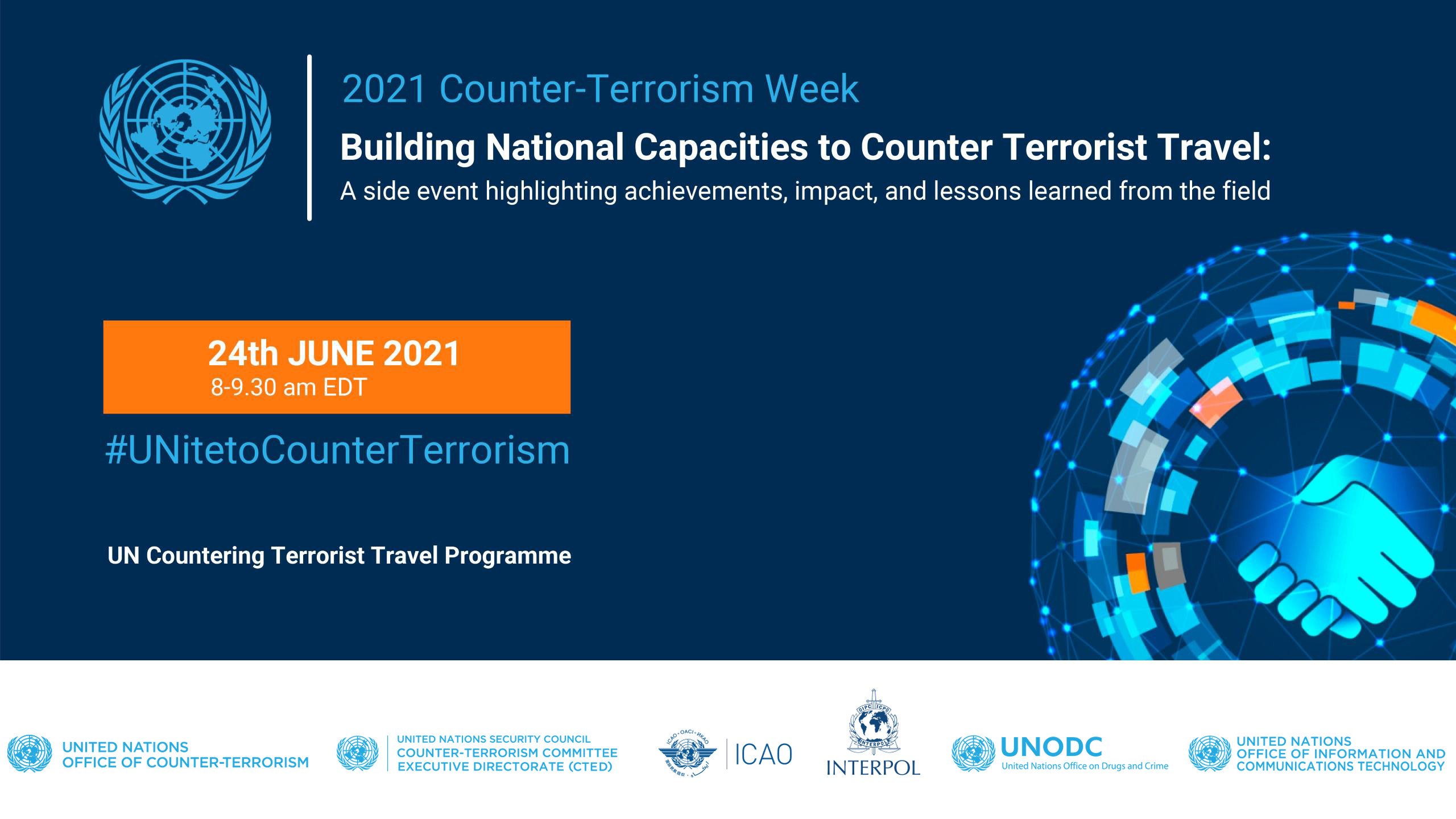Building National Capacities to Counter Terrorist Travel: A Side Event on the UN Countering Terrorist Travel Programme
On 24 June, the United Nations Office of Counter-Terrorism (UNOCT), together with UN Countering Terrorist Travel (CT Travel) Programme partners, organized a virtual side event, ‘Building National Capacities to Counter Terrorist Travel: Highlighting achievements, impact, and lessons learned from the field’, on the margins of the 2nd High-Level Conference of Heads of Counter-Terrorism Agencies of Member States during the 2021 Counter-Terrorism Week.
The United Nations Second Counter-Terrorism Week provided a platform for Member States, United Nations entities, international and regional organizations, civil society organizations, and the private sector to exchange information, experiences, and good practices, as well as to explore further cooperation on key counter-terrorism priorities under the four pillars of the United Nations Global Counter-Terrorism Strategy. The Second Counter-Terrorism Week followed the landmark 75th anniversary of the United Nations, and coincided the 15th anniversary of the United Nations Global Counter-Terrorism Strategy, and the 20th anniversary of the adoption of Security Council resolution 1373 (2001), which established the Security Council Counter-Terrorism Committee (CTC). The side event on the CT Travel Programme was among 34 side events that took place between 24 - 30 June 2021, contributing to conversations on global counter-terrorism efforts, challenges and priorities.
The side event highlighted national perspectives on UN efforts to support Member States to enhance their capabilities to use transformative technologies to prevent and counter terrorist threats through travel data collection, analysis, and exchange, while upholding human rights.
During the welcoming remarks, Mr. Vladimir Voronkov, United Nations Under-Secretary-General for Counter-Terrorism, highlighted that “properly designed and delivered API and PNR systems that respect human rights are instrumental tools to prevent and counter terrorism and serious crimes.”
This event provided insights and lessons learned on the ongoing national implementation of the CT Travel Programme in Azerbaijan, Botswana, Cote d´Ivoire, and The Gambia. Representatives from these beneficiary countries outlined the support received under the CT Travel Programme in terms of capacity-building, technical assistance, as well as operational support to assist in establishing systems to collect and analyze passenger data to detect and prevent terrorist travel as well as serious crimes.
During the event, CT Travel Programme partners, namely the United Nations Office of Counter-Terrorism (UNOCT), the Counter-Terrorism Committee Executive Directorate (CTED), the United Nations Office on Drugs and Crime (UNODC), the International Civil Aviation Organization (ICAO), the United Nations Office of Information and Communications Technology (OICT) and the International Criminal Police Organization (INTERPOL), also highlighted how the CT Travel Programme is mainstreaming a human rights approach in its support to Member States.
Since its launch in May 2019, the CT Travel Programme has been supporting beneficiary Member States in building their capabilities to detect and intercept terrorists and serious criminals through the use of API and PNR data. The programme also aims at improving the use of INTERPOL and other international law enforcement databases, as well as enhancing international information exchange, in accordance with UN Security Council resolutions 2178 (2014), 2396 (2017), and 2482 (2019), relevant privacy laws, human rights, and gender considerations.
Two years after the launch of the programme, over 40 beneficiary Member States are receiving tailored, comprehensive capacity-building support across the four pillars of the programme. These pillars include legislative frameworks, operational capacities, engagement with carriers, and technological support for the deployment and implementation of the UN goTravel software.
The CT Travel Programme is funded by generous contributions from the Kingdom of Netherlands, the European Union, the United States of America, the State of Qatar, Australia, Japan, Germany, the Republic of India, and in-kind support from Hungary.

For more information
Ms. Laurence Gerard (gerardl@un.org), Public Information Officer, UNOCT
Contacts of the press officers of the main partners

